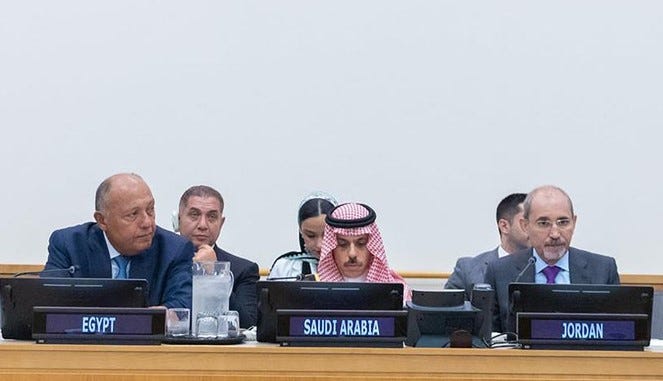 |
| Ministerial meeting convenes in New York, United States, on September 18, 2023 to discuss revitalizing the Middle East Peace Process. (SPA) |
The European Union, in collaboration with Egypt and Jordan, has jointly released a statement aimed at reinvigorating the peace process between Palestinians and Israelis, as reported by state news agency SPA on Tuesday.
The meeting, co-chaired by Saudi Foreign Minister Prince Faisal bin Farhan, brought together key figures such as Ahmed Aboul Gheit, the Secretary-General of the Arab League; Josep Borrell, the EU’s High Representative for Foreign Affairs and Security Policy; Ayman Safadi, Deputy Prime Minister and Foreign Minister of Jordan; and Sameh Shoukry, Egypt’s Foreign Minister.
This high-profile gathering included representatives from nearly 70 countries and international organizations, featuring about 50 speakers from diverse nations.
The primary objective of the meeting was to devise a comprehensive Peace Supporting Package designed to maximize the benefits of peace for both Palestinians and Israelis upon reaching a final peace agreement, as outlined in the report.
“The goal is to develop detailed programs and contributions, contingent on the achievement of a final status agreement, to bolster peace and ensure that all peoples in the region can enjoy its advantages. This endeavor aims to transform Peace Day into a day of opportunity and promise, thereby encouraging sincere efforts to attain it.”
The statement highlighted the ongoing challenges in achieving Israeli-Palestinian peace since the launch of the peace process in Madrid in 1991, with signed agreements, including the Oslo accords, not being fully upheld.
“Occupation persists, bringing forth numerous complexities and obstacles that push the parties further away from a potential agreement. The situation on the ground is increasingly unsustainable, and the status quo is becoming intolerable, particularly within an international landscape marred by conflicts. Neglecting the imperative to revitalize the peace process serves neither the interests of the parties involved nor the present and future of the Middle East.”
This renewed effort is rooted in the urgent necessity of upholding the Two-State Solution, ensuring the establishment of a viable, sovereign, independent, and contiguous Palestinian state based on the June 4, 1967 borders, as emphasized in the SPA report.
“The importance of rejuvenating a meaningful peace process to achieve the Two-State Solution, in accordance with international law, United Nations Security Council resolutions, the 2002 Arab Peace Initiative, and the 2013 EU peace support proposal, cannot be overstated. The alternative is further deterioration, which threatens regional and international security,” the statement emphasized.
“The Peace Day Effort is also built upon the Arab Peace Initiative (API), adopted by Arab states to outline their vision for a comprehensive regional peace and its terms and conditions. Founded on the complete withdrawal from all Palestinian and Arab territories occupied since 1967 in exchange for full normalization, the API gained later endorsement from the Organization of Islamic Cooperation and received a warm welcome from the European Union and the United Nations.
“Furthermore, the Peace Day Effort draws upon the 2013 EU offer to provide an ‘unprecedented package of political, security, and economic support’ to both parties in the context of a final status agreement.”
Additionally, the organizers initiated working groups tasked with elaborating on the components of the comprehensive Peace Supporting Package, inviting all participants to contribute to these efforts.
These Working Groups will concentrate on identifying substantive elements of the Peace Supporting Package, operating primarily at the Special Envoy or Ambassadorial level, and benefiting from input provided by experts.